Overview
Finding homecare for the elderly in your area can feel overwhelming, but you are not alone. It’s essential to assess the specific care needs of your loved ones, as this understanding is the first step toward ensuring their well-being. By researching local providers and evaluating caregivers, you can make informed decisions that truly reflect your family’s requirements.
As you embark on this journey, remember that understanding individual needs is paramount. Verify provider credentials to ensure they meet the necessary standards, and focus on compatibility with caregivers. This thoughtful approach can significantly enhance the quality of care for seniors, allowing them to thrive in a supportive environment.
We’re here for you every step of the way. Your comfort and peace of mind are our priority, and we encourage you to reach out for guidance and support as you navigate this important decision.
Introduction
Navigating the world of homecare services for seniors can feel overwhelming for families seeking the best support for their loved ones. With a rapidly aging population and an increasing preference for in-home care, understanding the various types of services available is essential. From personal care that enhances daily living to skilled nursing for complex medical needs, each category plays a crucial role in ensuring seniors maintain their dignity and independence.
This article delves into the key aspects of homecare services, guiding families through the process of assessing needs, researching providers, evaluating caregivers, and making informed decisions that prioritize the well-being of their elderly relatives. By equipping families with the right knowledge, we hope to empower them to navigate this critical journey confidently, ensuring they secure the best possible care for their loved ones. Remember, we’re here for you, and your comfort is our priority.
Understand Homecare Services Available for Seniors
Homecare assistance for seniors encompasses three main categories, each thoughtfully designed to address unique needs:
- Personal Care Assistance: These supports help with essential daily activities, such as bathing, dressing, grooming, and meal preparation. Caregivers provide not only practical help but also companionship, enabling seniors to maintain their independence in a familiar environment while addressing their emotional support needs.
- Skilled Nursing Assistance: Delivered by registered nurses (RNs) or licensed practical nurses (LPNs), these services include vital medical support like medication management, wound treatment, and oversight of chronic conditions. Skilled nursing is crucial for seniors facing complex health issues, ensuring they receive the necessary medical attention in the comfort of their homes.
- Companionship Offerings: Focused on social interaction and emotional support, these services help reduce feelings of loneliness and isolation. Caregivers engage seniors in conversation, accompany them on outings, and provide a warm presence, which is essential for mental well-being, highlighting the increasing demand for homecare for elderly near me as we approach 2025, reflecting a growing preference for non-institutional assistance options. Understanding these categories allows families to identify the specific homecare for elderly near me services their loved ones may require, ensuring a tailored approach that enhances their quality of life.
For more information or to schedule a consultation, remember, we’re here for you. Contact Best Care Nurses Registry today.
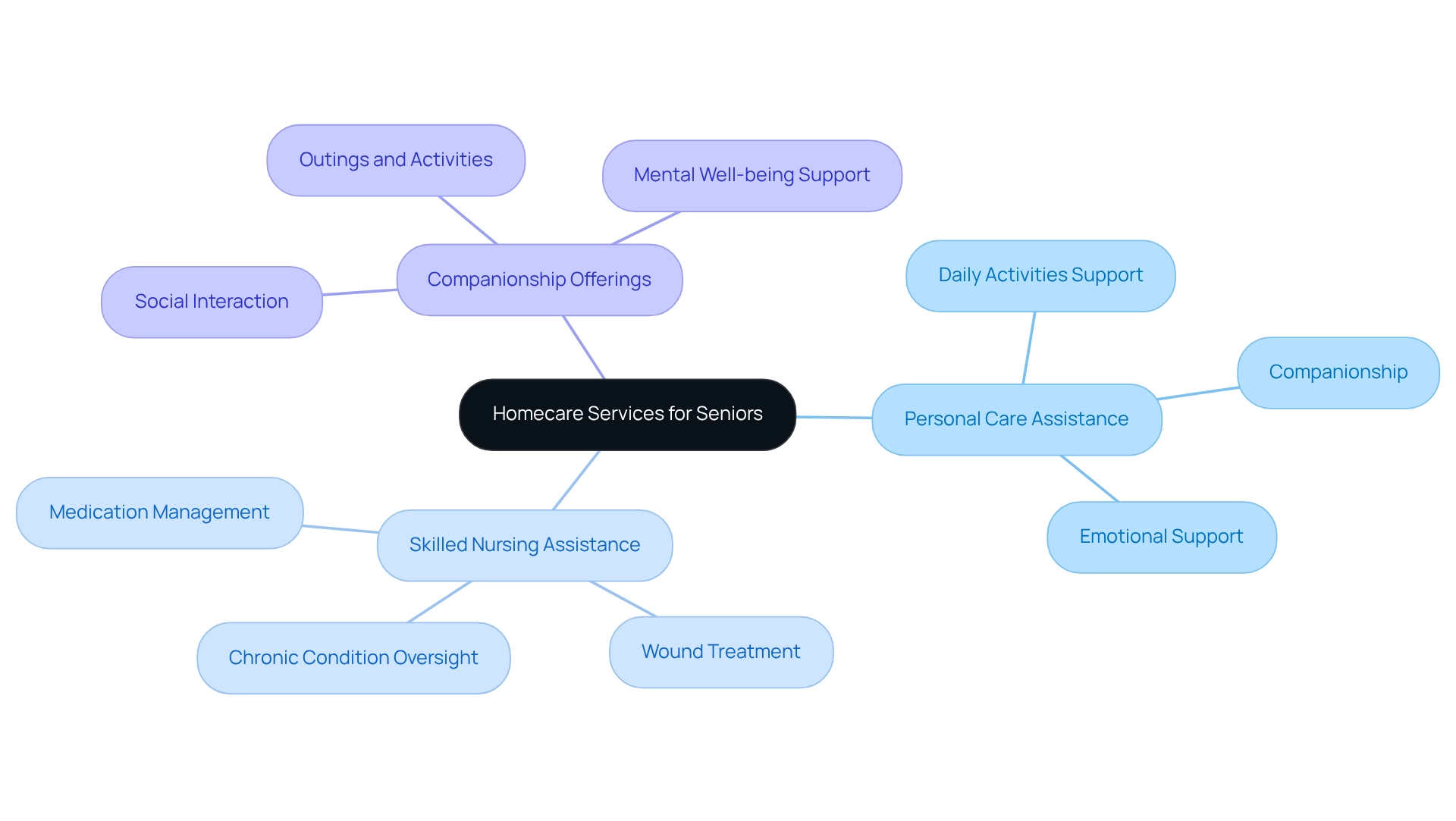
Assess Your Specific Care Needs and Preferences
To effectively evaluate support needs for elderly individuals, it’s essential to follow these caring steps:
-
Evaluate Daily Living Activities: Start by identifying which daily tasks your loved one can manage independently and which require assistance. Key activities include bathing, dressing, cooking, and medication management. Understanding these needs is crucial, as many seniors struggle with activities of daily living (ADLs). This highlights the importance of tailored support that meets their unique requirements.
-
Consider Medical Conditions: It’s important to take into account any chronic illnesses or medical issues that may require specialized attention. Conditions such as diabetes, mobility impairments, or cognitive challenges can significantly impact daily functioning and necessitate specific interventions.
-
Discuss Preferences: Engage your loved one in heartfelt discussions about their treatment preferences. This includes their desired level of independence, preferred caregivers, and any routines they wish to maintain. Such conversations are vital for ensuring that support aligns with their wishes, fostering a sense of autonomy.
-
Involve Family Members: Collaborate with family members who may have valuable insights into the senior’s needs and preferences. This collective approach guarantees a thorough understanding of the situation, enabling a more effective support plan.
-
Document Findings: Create a written summary of the assessment to guide your search for homecare for elderly near me services. This document will be essential when discussing choices with prospective providers, ensuring that all parties are aligned on the support requirements.
By following these steps, families can better navigate the complexities of elder assistance, ensuring that their loved ones receive the appropriate support customized to their unique needs. Remember, we’re here for you, and your comfort is our priority.
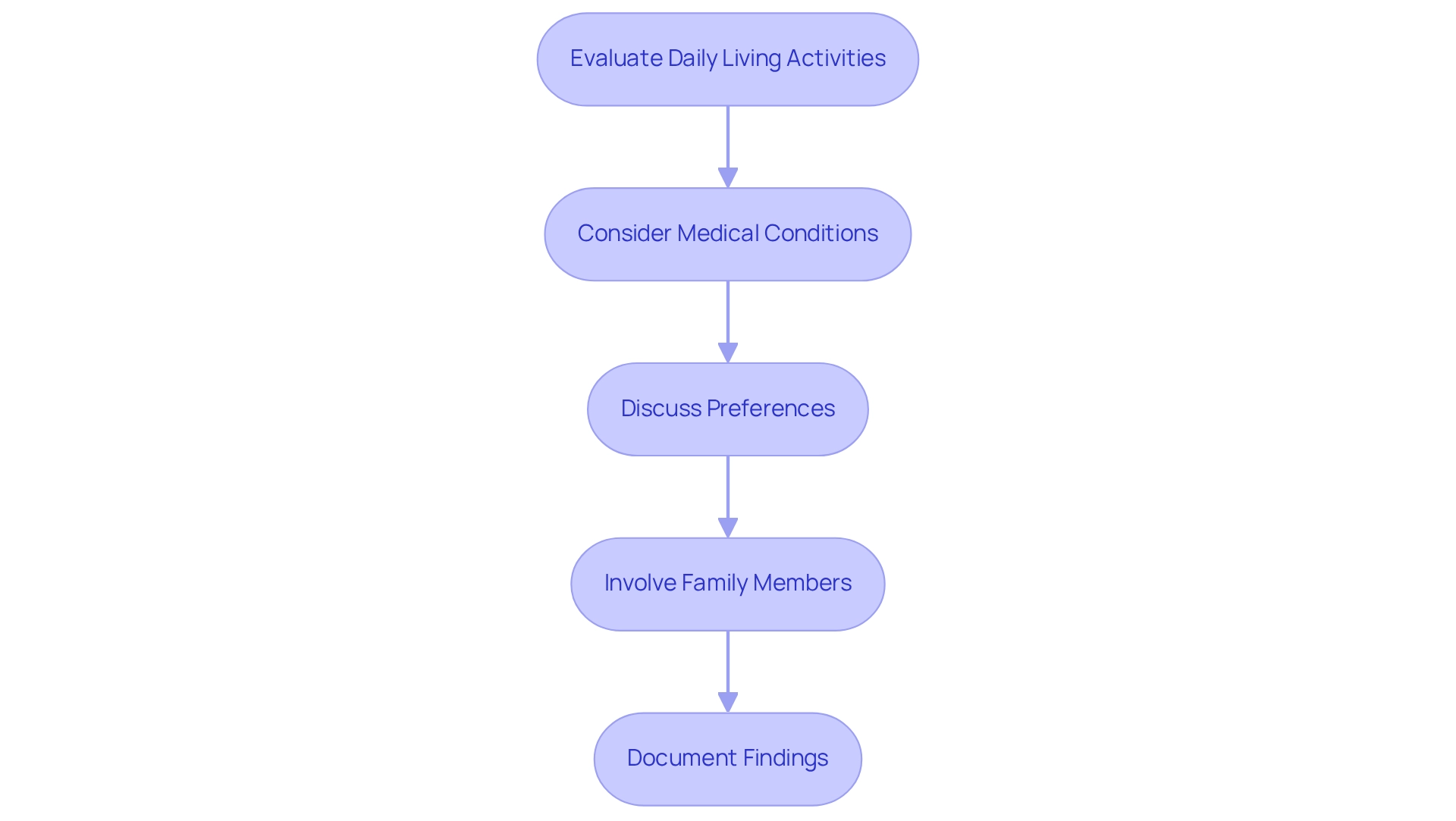
Research Local Homecare Providers and Their Offerings
To effectively research homecare for elderly near me, follow these steps:
- Utilize online resources to begin your journey by exploring online directories and review platforms to create a comprehensive list of homecare for elderly near me. Websites such as Caring.com and AARP offer valuable insights and user reviews that can guide your decision-making process.
- Check Credentials: It’s essential to verify that the agencies you are considering are licensed and accredited. This step ensures adherence to state regulations and standards for quality services, providing peace of mind for families. Compare Offerings: Take the time to examine the specific options each provider presents. While some agencies may specialize in personal care, others might focus on skilled nursing or companionship. Understanding these distinctions will help you find the right fit for your loved one’s needs related to homecare for elderly near me. Read Reviews and Testimonials: Explore comments from families who have previously used the offerings. Pay close attention to feedback regarding caregiver quality, reliability, and overall satisfaction, as these insights can significantly influence your choice.
- Contact Providers: Reach out to potential suppliers to inquire about their offerings, availability, and pricing. This initial interaction not only clarifies your questions but also provides a glimpse into their customer service approach, which is vital for establishing a trusting relationship.
As the home healthcare market is projected to grow at a compound annual growth rate (CAGR) of 7.96% from 2024 to 2030, understanding how to navigate this landscape is increasingly important. Additionally, with the implementation of Electronic Visit Verification (EVV) systems mandated by the 21st Century CURES Act, families can expect enhanced operational efficiency and improved patient care in the home health care sector. By following these steps, you can ensure that you select a provider that meets your expectations and supports the well-being of your loved ones.
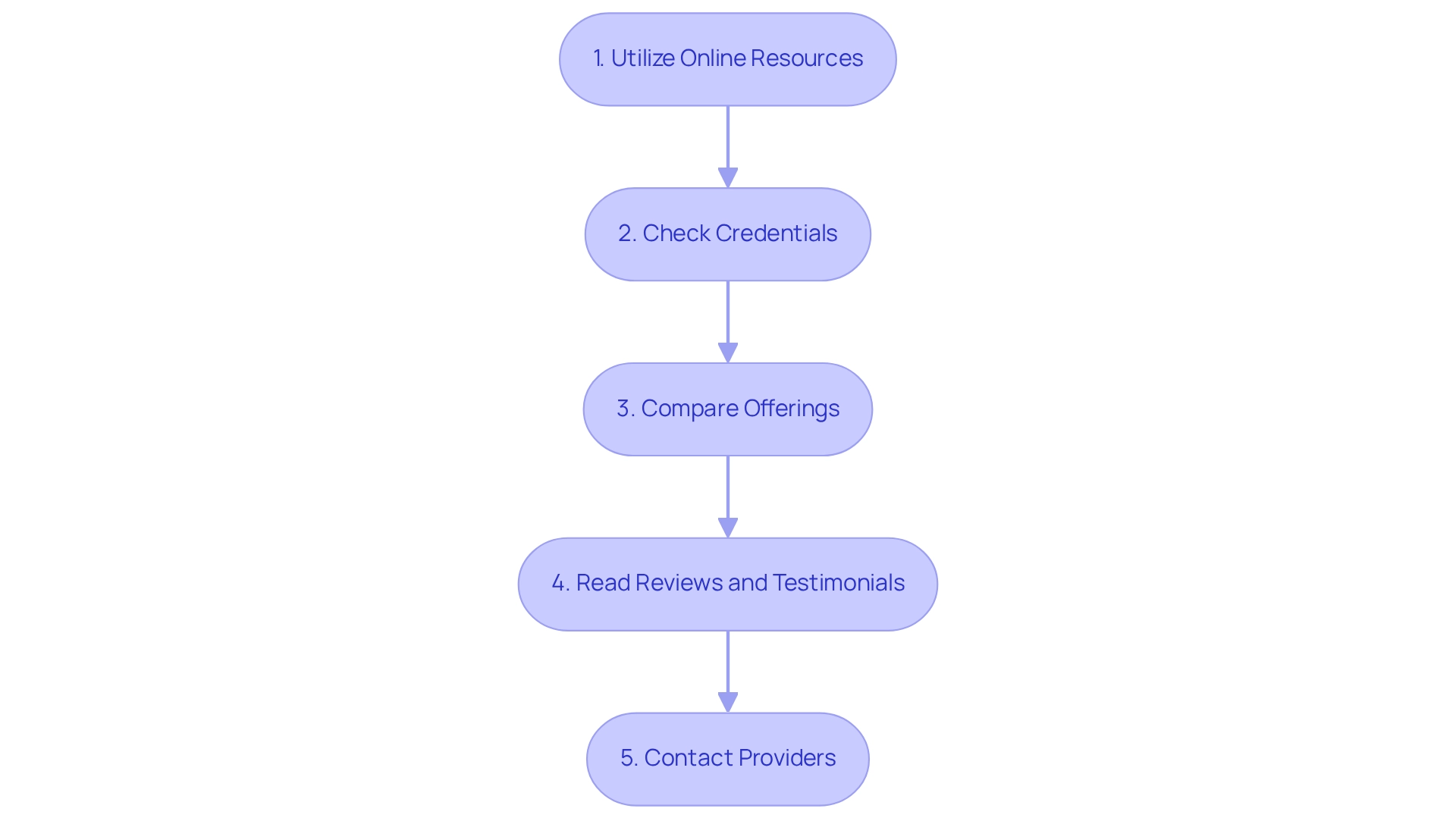
Evaluate Caregivers for Compatibility and Trustworthiness
When assessing individuals who provide homecare for elderly near me, it’s essential to consider several important criteria that can significantly impact your loved one’s well-being, such as their experience and qualifications. This ensures they possess the necessary skills to deliver quality care. Research shows that providers with specialized training, such as CNAs (Certified Nursing Assistants) who focus on medical tasks, can greatly improve patient outcomes. This makes it a crucial factor in your decision. Additionally, it’s important to recognize that younger caregivers often face a 90 percent decrease in their retirement savings due to caregiving duties, highlighting the need for their qualifications and financial stability.
-
Personality and Compatibility: Organize a preliminary meeting between the provider and your loved one. Observe their interaction to gauge compatibility in terms of personality, communication style, and comfort level. Studies indicate that compatibility between support providers and clients is linked to greater satisfaction among seniors, underscoring the significance of this phase.
-
References and Background Checks: Request references from past clients and conduct thorough background checks to confirm the individual’s history and reliability. This step is vital for ensuring the safety and trustworthiness of the provider, helping to identify any potential red flags.
-
Communication Skills: Assess how effectively the provider communicates with both you and your loved one. Effective communication is crucial for establishing trust and ensuring that support needs are met. Caregivers who excel in this area can significantly alleviate the emotional distress often experienced by families, as highlighted in recent reports. Maintaining open communication with the provider and the homecare for elderly near me is essential for ensuring quality care.
-
Trial Period: If possible, arrange a trial phase where the provider can offer services for a short duration. This allows both the caregiver and your loved one to assess the fit before committing long-term. Effective trials can lead to better caregiver-client connections, ultimately enhancing the quality of assistance provided.
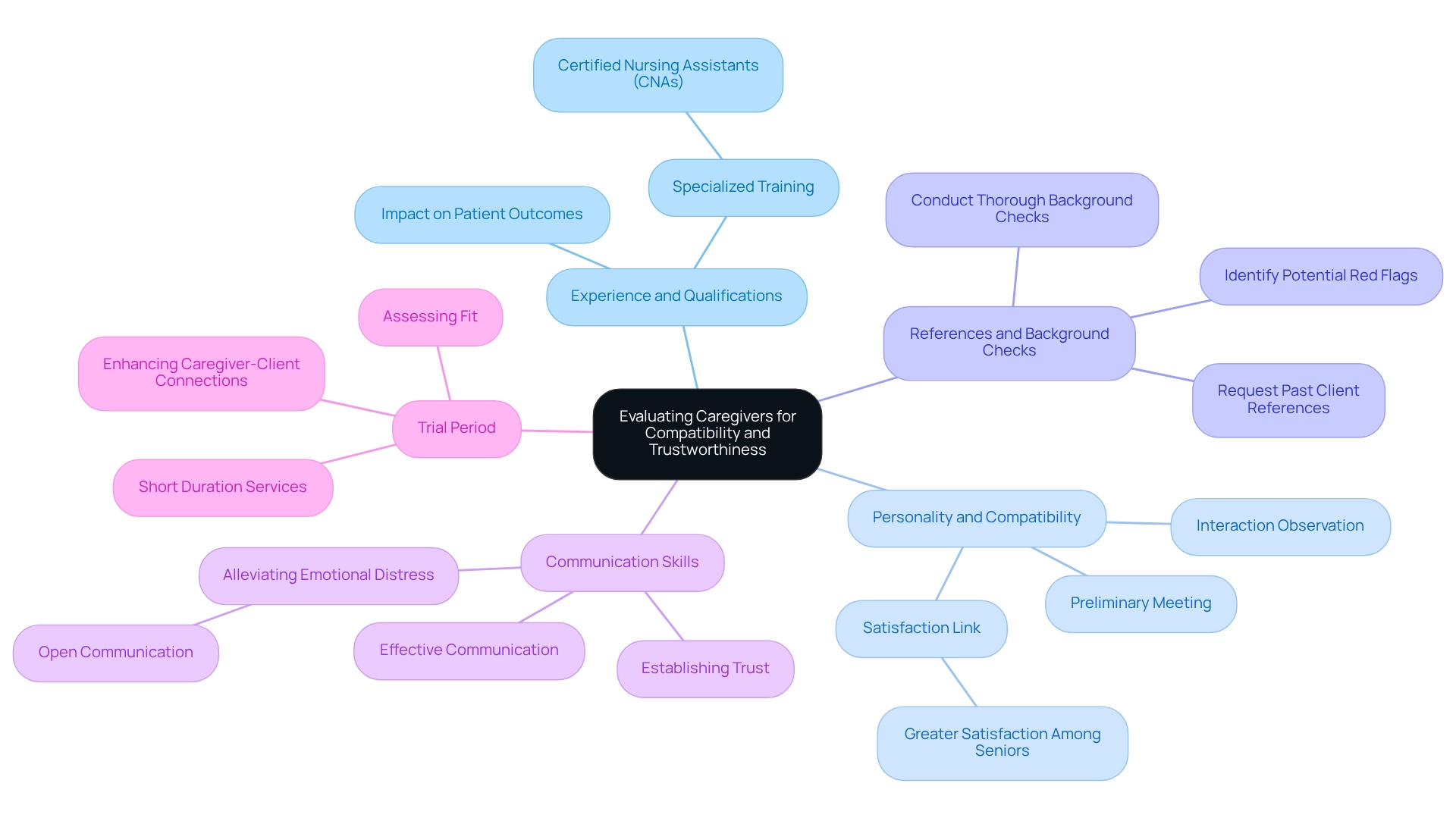
Make an Informed Decision and Finalize Care Arrangements
To finalize care arrangements effectively with Best Care Nurses Registry, consider the following steps:
-
Review Contracts and Agreements: Take the time to thoroughly examine any contracts or partnership agreements from Best Nurses Registry. Pay close attention to the terms, including payment structures, cancellation policies, and any additional fees that may apply. Best Support accepts various payment methods, including long-term support insurance, private payment, and VA benefits, making it easier to find a suitable financial arrangement.
-
Discuss Support Plans: Collaborate with Best Care’s compassionate team to create a personalized support plan that outlines the specific services needed, schedules, and caregiver assignments. This plan should represent the unique needs of your loved one, ensuring that all elements of support are addressed. The group at Best Support is committed to customizing assistance solutions that prioritize the well-being of your family member.
-
Establish Communication Channels: Create clear communication pathways with both Best Nurses Registry and the assigned caregiver. Discuss how to report concerns or changes in support needs, ensuring that everyone involved is on the same page. The team at Best Assistance is always just a phone call away, prepared to help with any questions you may have.
-
Monitor Service Quality: Once assistance begins, regularly check in with your loved one and the provider to confirm that the support offered aligns with expectations. Open communication is essential for promptly addressing any issues that may arise. Best Care’s skilled team members are dedicated to providing top-notch assistance and ensuring your satisfaction.
-
Adjust as Necessary: Be prepared to alter the treatment plan as required. Regular evaluations and feedback will help ensure that your loved one continues to receive the best support, adapting to any changes in their condition or preferences. Best Care Nurses Registry highlights the significance of adaptability in support to meet changing requirements.
In South Florida, the typical monthly expense for home health aides is around $5,256. This figure emphasizes the importance of making informed choices regarding support arrangements. A comprehensive understanding of the costs and services available can significantly enhance family satisfaction with homecare for elderly near me. According to the 2023 Cost of Support Survey, families who actively participate in the planning process report high levels of satisfaction, emphasizing the importance of individualized assistance. As Samir Shah, CEO of CareScout Services, states, “CareScout believes that person-focused support is essential for enhancing the aging experience, making it more dignified, connected, and fulfilling as it addresses not only physical well-being but also mental, social, and spiritual wellness.” Furthermore, to be eligible for Medicare home health assistance, patients must need skilled support, have a physician’s plan, and be homebound. By following these steps, families can ensure that they secure the best possible care for their loved ones.
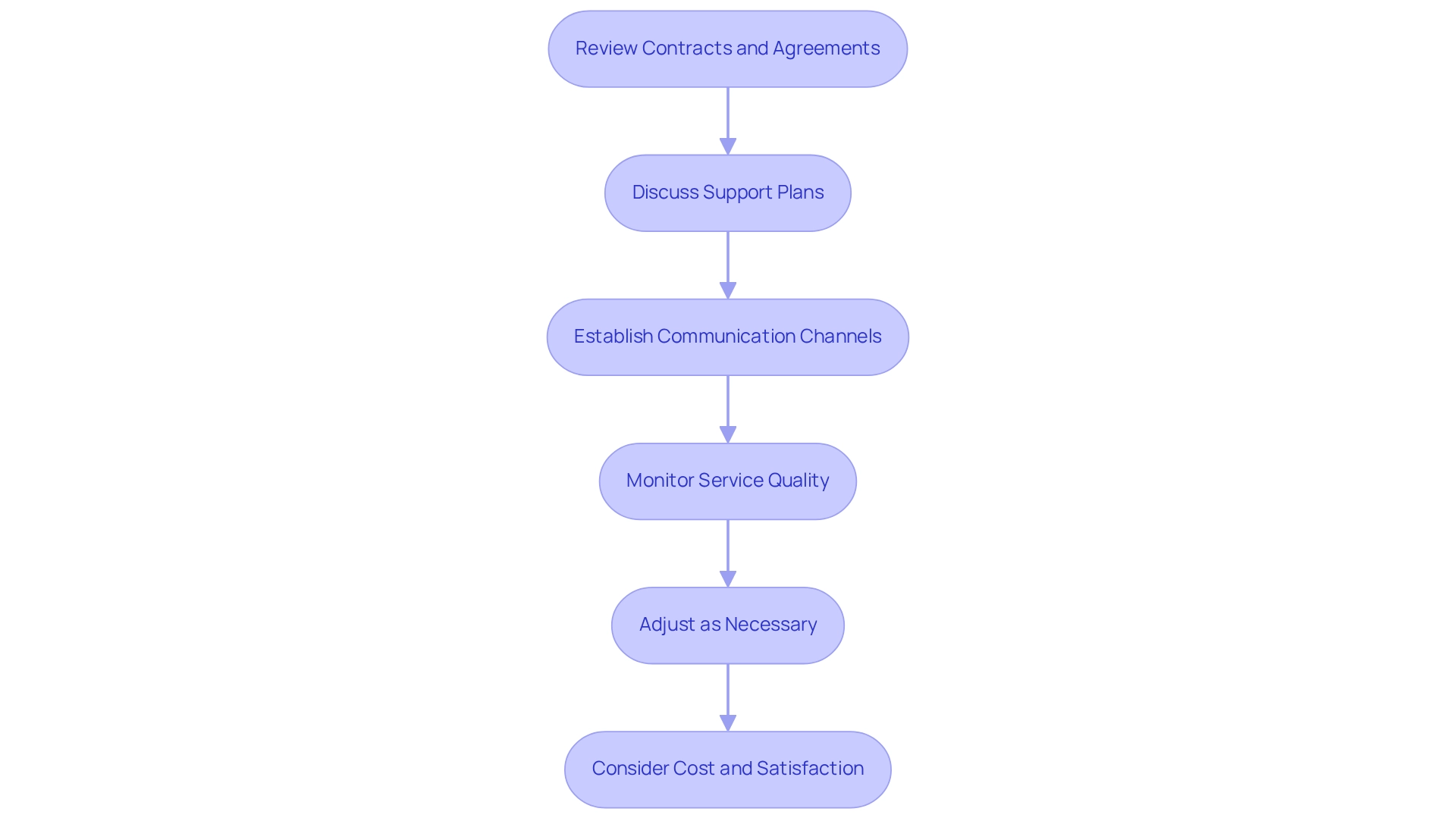
Conclusion
Navigating the landscape of homecare services for seniors can feel overwhelming, but with careful consideration and informed decision-making, families can find the right support for their loved ones. Understanding the different categories of homecare—personal care services, skilled nursing, and companionship—allows families to pinpoint the specific assistance that meets their needs. By evaluating daily living activities, medical conditions, and personal preferences, families can craft a comprehensive care plan that honors the autonomy and dignity of the elderly.
Researching local providers and assessing caregivers are essential steps in this journey. Families are encouraged to utilize online resources to compare services, check credentials, and read reviews. This ensures they select a trustworthy and compatible caregiver. The importance of communication and compatibility cannot be overstated; these elements significantly influence the quality of care and overall satisfaction.
As families make informed decisions and finalize care arrangements with reputable agencies like Best Care Nurses Registry, they secure the best possible support for their loved ones. By reviewing contracts, discussing care plans, and maintaining open lines of communication, families can adapt care as needed, ensuring that their loved ones receive the personalized support essential for their well-being. In this critical journey, prioritizing individualized care nurtures an environment where seniors can thrive in the comfort of their own homes.
Frequently Asked Questions
What are the main categories of homecare assistance for seniors?
Homecare assistance for seniors encompasses three main categories: Personal Care Assistance, Skilled Nursing Assistance, and Companionship Offerings.
What does Personal Care Assistance include?
Personal Care Assistance includes support with essential daily activities such as bathing, dressing, grooming, and meal preparation. Caregivers provide practical help and companionship, allowing seniors to maintain independence while addressing their emotional support needs.
What services are provided under Skilled Nursing Assistance?
Skilled Nursing Assistance is delivered by registered nurses (RNs) or licensed practical nurses (LPNs) and includes medical support like medication management, wound treatment, and oversight of chronic conditions, ensuring seniors receive necessary medical attention at home.
How do Companionship Offerings support seniors?
Companionship Offerings focus on social interaction and emotional support, helping to reduce feelings of loneliness and isolation. Caregivers engage seniors in conversation, accompany them on outings, and provide a warm presence, which is essential for mental well-being.
What steps should be taken to evaluate the support needs of elderly individuals?
To evaluate support needs, follow these steps: 1. Evaluate Daily Living Activities to identify tasks needing assistance. 2. Consider Medical Conditions that may require specialized attention. 3. Discuss Preferences with the elderly individual regarding their care. 4. Involve Family Members for a comprehensive understanding of needs. 5. Document Findings to guide the search for appropriate homecare services.
Why is it important to assess daily living activities for seniors?
Assessing daily living activities is crucial because many seniors struggle with activities of daily living (ADLs). Understanding which tasks require assistance helps tailor support to meet their unique requirements.
How can family involvement benefit the assessment of an elderly individual’s needs?
Involving family members can provide valuable insights into the senior’s needs and preferences, ensuring a thorough understanding of the situation and enabling a more effective support plan.
What should be done after evaluating the care needs of a senior?
After evaluating care needs, create a written summary of the findings. This document will be essential when discussing options with prospective homecare providers to ensure alignment on support requirements.











